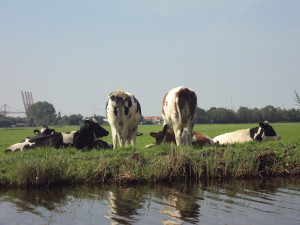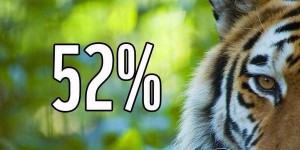Worldlog Tjedan 42 – 2014
Kao frakcija Donjeg doma, Stranka za životinje imala je dobar kraj tjedna. U četvrtak navečer objavljeno je da smo moja kolegica Esther Ouwehand i ja obje u top 15 ljudi na području Održivog razvoja u dnevnim novinama Trouw. Top 100 ljudi na području Održivog razvoja je lista koja se svake godine obnavlja i na njoj se nalaze Nizozemci koji su vrlo utjecajni na području održivog razvoja. Esther se nalazi na petnaestom mjestu, te je osoba koja se najbrže penje na ljestvici (prošle je godine bila na osamdeset i petom mjestu). Ja sam prošle godine bila osamnaesta, sad sam jedanaesta.
Nadamo se da će se drugi političari nadahnuti ovime i da će cijela naša frakcija stajati u top 15. Ponosna sam što je naša stranka toliko dobro praćena. Planetarna vizija naše stranke,koja na kraće staze ne stavlja potrebe ljudi centar pažnje, posvuda osvaja sve više ljudi.
Lijepo je i javiti da se moj Worldlog posebno spomenuo u intervjuu kojeg sam dala dnevnim novinama Trouw. Nadam se da će moj tjedni blog doprinijeti da se diljem svijeta nadahnu ljude da se uključe u sve aspekte održivog razvoja.
Esther se osobito istaknula kod žirija zbog svoje ustrajne borbe protiv poljoprivrednih otrova. Suočila se sa poljoprivrednicima i proizvođačima otrova i postavila na noge stranicu za prijave Gifklikker.nl. Proizvođači otrova naveliko se žale po novinama zbog uspjeha njezine borbe. Ona se na to uopće ne obazire 😉 Na njezinu inicijativu objavilo se izviješće Gezondheidsraada (Odbora za zdravlje) o opasnostima poljoprivrednog otrova. Kabinet prihvaća većinu preporuka, pa se već prvi opasni otrovi zabranjuju. Dosad odbaćeni i ignorirani rizici poljoprivrednog otrova za ljude i životinje, zahvaljujući Estherinoj borbi sada stoje u središtu pažnje! Čestitam Esther!
Već sada možemo reći da je 2014. godina povijesna godina za našu stranku. Izveli smo dvije uspješne izborne kampanje, čime smo povećali broj predstavnika na lokalnoj razini i zauzeli mjesto u Europi. Također smo zajedno s Pink!, organizacijom mladih naše stranke, pokrenule akciju protiv neodržive politike banke Donjeg doma, Royal Bank of Scotland. Donji je dom nakon toga pokrenuo inicijativu promjene banke. Ponosna sam na našu stranku!
Prošlog smo se tjedna zauzeli za pašnju krava. Želimo da vlada povuće prijedlog zakona „odgovorni rast proizvodnje mlijeka“ i umjesto njega uvede zakon o obaveznoj pašnji.
Naime, posve je nečuveno da vlada daljnji rast i industrijalizaciju proizvodnje mlijeka naziva odgovornim. Nizozemska proizvodnja mlijeka već sada puca od veličine. Nije nam potreban rast, već smanjenje broja grla. Nisu nam potrebne megastaje, već slobodne životinje na pašnjacima.
U travnju 2015., povući će se Europska kvota mlijeka. Time će si Europa oduzeti jedini instrument koji je imala da obilnu proizvodnju mlijeka drži pod kontrolom i zaustavi povećanje. Zahvaljujući prijedlogu zakona proizvodnja će mlijeka postati novi oblik bio-industrije, pa će već gigantsko brdo gnojiva i dalje rasti. Zalažemo se, dakle, za zakon koji će se temeljiti na proizvodnji mlijeka vezanu za zemlju, pa će se tako i stočna hrana proizvoditi lokalno i neće se proizvoditi gnojiva više nego što će lokalno biti potrebno!
U Donjem sam domu prošlog tjedna uručila prijedlog da se do 2018. godine zabrani ubijanje muških pilića. Glasanje vezano za ovo temu biti će 14. listopada. više o ovoj temi u mom blogu idućeg tjedna.
Pročitaj ovdje o šokantnom zaključku o tome koliko smo životinjskim vrsta već izgubili na Zemlji: ‘We HAVEN’T lost 50% of our animals – the truth is MUCH worse!’
Ugodan tjedan vam želim! Pozdrav, Marianne
We, as the MPs of the Party for the Animals, had a great closure of the week. On Thursday evening it was announced that my colleague Esther Ouwehand and I are both in the top 15 of the Sustainable 100 of the Dutch daily newspaper Trouw. The Sustainable Top 100 is an annually recurring list of Dutch people who are influential in the area of sustainability. Esther ranks fifteenth and is the fastest climber in the list as a result (she ranked #85 last year). I ranked eighteenth last year, now eleventh.
We hope that other politicians will be inspired by the fact that our entire parliamentary group is in the top 15. I am proud that our Party has so many followers. Our Party’s planet-wide vision, where short-term human interests are not central, is gaining more and more ground.
I’m pleased to let you know that my Worldlog was specifically mentioned in the interview I had with the daily newspaper Trouw. I hope that my weekly blog contributes to inspire people world-wide to make an effort for a sustainable community.
Esther struck the jury because of her decisive fights against agricultural pesticides. She defied the powers of the farmers and pesticide producers and established a contact point: Gifklikker.nl. Pesticide producers are complaining about her successful fight in full-page advertisements in newspapers. It doesn’t bother her at all 😉 It was on her insistence that the report of the Health Council of the Netherlands on the dangers of agricultural pesticide was published. The government is largely accepting the recommendations, as a result of which the first dangerous pesticides will be banned. The risks of agricultural pesticides for humans and animals, which were minimised until recently, are in the spotlight now thanks to Esther’s fight. Congratulations Esther!
It can already be asserted that 2014 is going to be a historic year for our Party. We conducted two successful election campaigns, resulting in us doubling our number of municipal council seats and we achieved one seat in Europe. We also campaigned together with Pink!, the youth organisation of the Party, against the unsustainable policy of the house bank of the Dutch Lower House: the Royal Bank of Scotland. Following that, the Lower House adopted a motion to change its house bank. Proud of our Party!
Last week, we have stood up for cows to be allowed to graze outdoors. We want the government to withdraw the bill ‘Responsible Growth of the Dairy Farming Industry’ and to replace it by a statutory duty to enforce outdoor grazing for cows.
After all, it is outrageous that the Government believes that further growth and industrialisation of dairy farming can still be called a responsible action. The Dutch diary farming industry is already bursting at the seams. We don’t need growth but we need the livestock herd to be reduced. And there should not be more megastables but more outdoor grazing for animals.
The European milk quotas will expire by April 2015. By doing so, Europe is deleting the only instrument that it had to somewhat control the livestock herd and to restrict the increase in scale. The diary farming industry will become a new form of bioindustry thanks to this bill and the already enormous surplus of manure will grow even more. That is why we advocate a law that seeks for land-oriented dairy farming, growing food locally and where no more manure is produced than can be used locally.
I also submitted a motion in the Lower House last week to ban the culling of one-day-chicks by 2018. This will be voted on on the 14th of October. Read more about this in next week’s Worldlog.
Read here: the shocking conclusion about the number of animal species that we have already lost on earth: ‘We HAVEN’T lost 50% of our animals – the truth is MUCH worse!’
Have a great week! Greetings, Marianne


